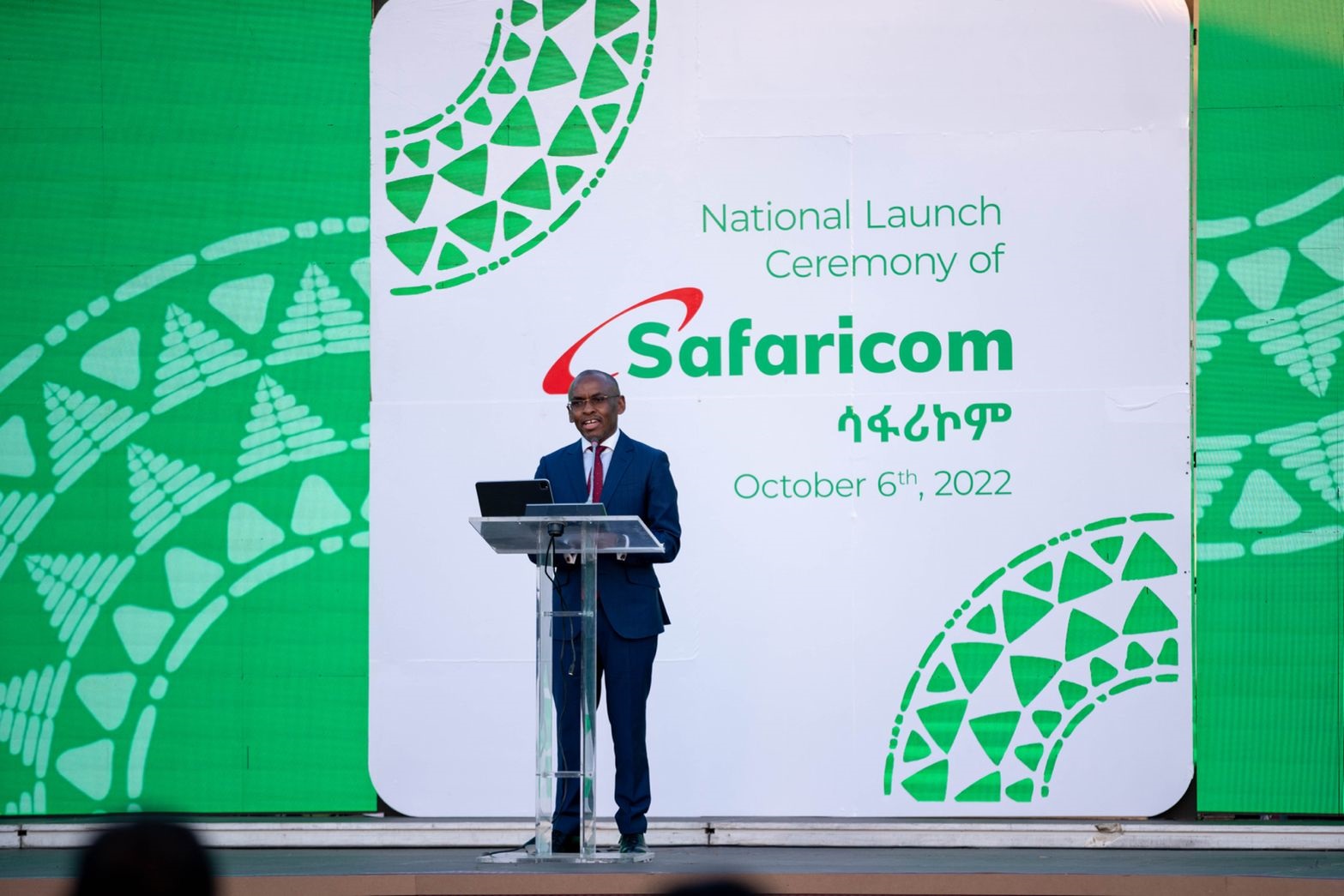As Kenya’s Safaricom officially launched its Ethiopian network on Thursday—becoming the first private operator in one of Africa’s largest telecoms markets—Ethiopia’s government welcomed M-Pesa.
Safaricom Ethiopia’s launch follows a ten-city pilot and a phased launch across the country, which started in August 2022 in the city of Dire Dawa, 350km east of Addis Ababa, the Ethiopian capital. Until now, state-owned Ethio Telecom operated as a monopoly with 54 million subscribers in Ethiopia, Africa’s second most populous country with an estimated population of 118 million people.
Safaricom Ethiopia—so far the only competitor to state-owned Ethio Telecom—plans to roll out services in 14 additional cities between now and April 2023 to cover 25 cities and enable it to meet the 25% population coverage obligation in its licence.
This is Safaricom’s first expansion outside Kenya, where it holds a virtual monopoly in the telecoms and mobile money sectors. Now it will be forced to compete with another monopoly, Ethio Telecom. So far, there is no significant difference in how Safaricom’s voice, data and SMS bundles are priced compared to Ethio Telecom signalling that it may have wisely chosen to avoid a pricing war. Safaricom will likely build its offering on superior service—which means significant and rapid building out of its network coverage. Ethio Telecom has been dogged by poor service complaints, especially for weak internet service.
On its part, Ethio Telecom is flexing its muscles as it readies itself to face competition for the first time. Last month, it announced plans for a music and video streaming service. It also said that it wants to grow subscriber numbers by 10.3% to 73.5 million over the next year. And in August, Ethio Telecom released three new mobile financial services, developed in partnership with Addis-based Dashen bank.
Giants faceoff
At the ceremony held to celebrate Safaricom’s launch, Ethiopia’s minister of Finance announced that his government had awarded Safaricom permission to roll out M-Pesa, its widely successful mobile money product, in Ethiopia. The announcement followed President Ruto’s speech where he expressed confidence that Ethiopia would grant Safaricom’s mobile money license request in a deal that was reportedly finalised by President Ruto and Ethiopia’s Prime Minister Abiy Ahmed in Addis Ababa.
In April, Ethiopia’s central bank said it had drafted a Bill to pave the way for foreign investors like Safaricom to offer mobile money services. Existing laws only allowed locally owned non-financial institutions to offer the services. Ethiopia’s mobile payments scene is dominated by a handful of small operations and Ethio Telecom’s Telebir.
It is worth noting that plans for a mobile finance license had been ongoing for a while. Until now, those talks had been hamstrung by bureaucracy which slow-walked any mobile financial services licenses to give incumbent Ethio Telecom and its recently introduced Telebirr service more runway.
Expanding M-Pesa into Ethiopia is a potential win for Safaricom Ethiopia if it can replicate its successes in Ethiopia outside Kenya. For president Ruto, the deal is an addition to a string of early wins including Safaricom’s reduction of Fuliza loan charges last week.
“We have deepened digital and financial inclusion in Kenya by connecting people to people, people to opportunities and people to information. With these lessons and experiences, we look forward to positively impacting the people of Ethiopia with a sustainable and quality mobile network that will be a vital launch pad for nationwide digital telecommunications services to over 118 million Ethiopians,” said Peter Ndegwa, Safaricom CEO.
Ethiopia is currently stuttering through more reform in the telecommunications sector, including the breakup of state-owned Ethio Telecoms through a 40% sale of the company to private investors. After French telecom giant Orange, expressed interest, the government suspended the sale citing “fast-moving macroeconomic changes both globally and from a country perspective.”
The Safaricom Ethiopia consortium, which was awarded a license from a 2020 tender, comprises Safaricom Kenya, with a controlling stake of 55.7%, Japan’s Sumitomo with 27.2%, the UK government’s British International Investment (BII) with 10.9% and Vodacom of South Africa at 6.2%. Vodafone is listed as a shareholder through its stake in Vodafamily Ethiopia Holding, a UK-based outfit owned by Safaricom (90%) and Vodacom (10%). South Africa’s Vodacom is itself a shareholder in Safaricom Kenya.
Safaricom Ethiopia’s launch comes as Ethiopia’s government and leaders of Tigray prepare for AU-led peace talks. Kenya’s former president, Uhuru Kenyatta, is favoured by the Tigrayan leaders to lead negotiations, while Abiy’s government has signalled a preference for Nigeria’s Olusegun Obasanjo. Kenyatta was asked to serve as peace envoy for the Great Lakes Region and the Horn of Africa, by Kenya’s William Ruto.
How Safaricom Ethiopia performs remains to be seen. For now, political overtones of Ethiopia’s private sector reform and Safaricom Ethiopia’s launch overshadow the conversation. While M-Pesa is available in 9 African countries, copycats have struggled to replicate its Kenyan success. That may be partly because it lacked the support of Safaricom, M-Pesa’s parent. This time, it may be different. Safaricom will be running the show.



















